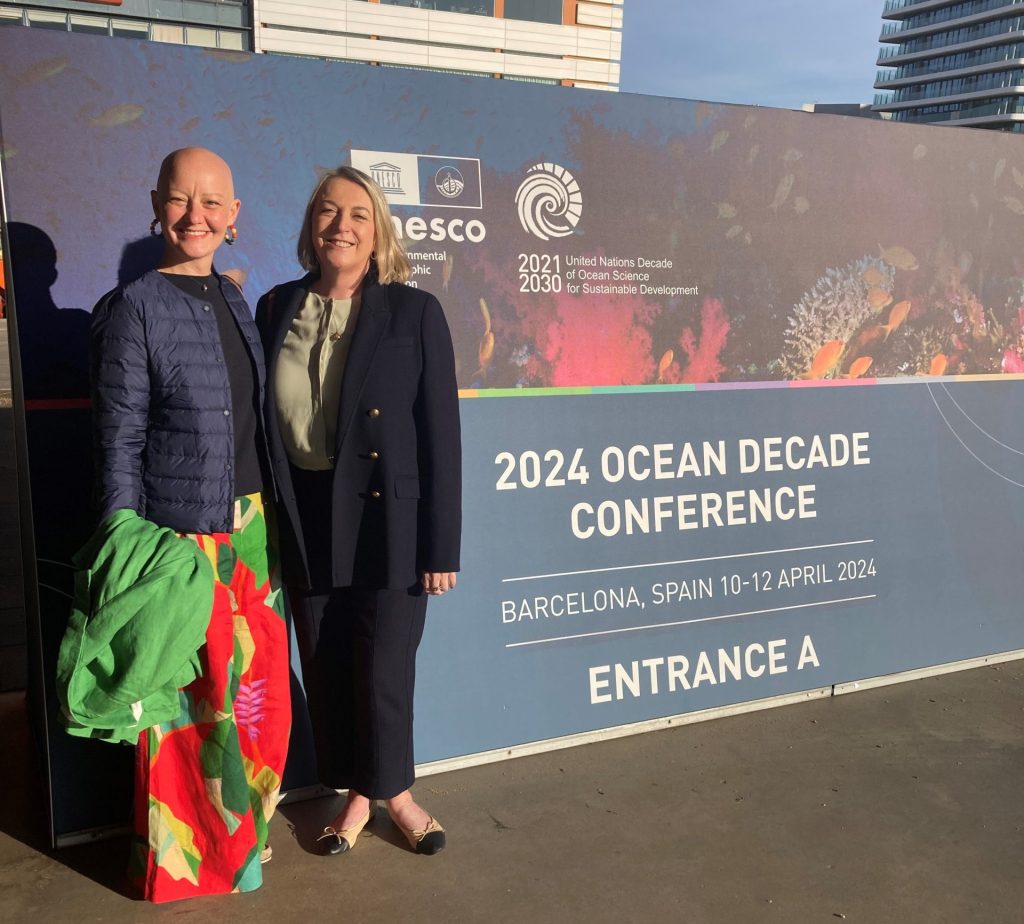IFAN CEO Catherine Mulvihill and Development Manager Francesca Pradelli were delighted to attend the Ocean Decade Conference in Barcelona (10-12 April). Here they discuss their key takeaways from the event.
How was the 2024 Ocean Decade Conference?
FP: It was busy! Both in terms of people attending it, around 1500, and in terms of number and topics of discussions.
CM: This being my first Ocean Decade Conference I was immediately struck by the breadth of the topics that we under discussion and the passion of those taking part
What were the key themes and issued raised?
FP: The Conference was around the “Ocean Decade”, a 10-year framework initiative launched by the UN to identify, generate and use critical ocean knowledge to manage the ocean sustainably. The plenary sessions and the side events of the Conference had four main sessions: Science and Solutions for a Clean, Healthy and Resilient Ocean; Science and Solutions for a Sustainable and Resilient Ocean Economy; Science and Solutions for a Safe and Predicted Ocean; An Inspiring and Engaging Ocean for All.
How important is it for IFAN to be seen at conferences such as this and what do you think you gain from it as a foundation?
FP: I believe that is key for IFAN to attend international gatherings such as the 2024 Ocean Decade Conference or the UN Ocean Conference next year in Nice, France, to continue building a strong network of sister foundations, international and non-governmental organisations and government representatives with whom sharing IFAN’s mission and thus find potential initiatives to support around the world, to enhance safety of life at sea and protect the marine environment. Meeting face to face with people, listening to the challenges that face the ocean and find opportunities to contribute, is key for IFAN to reach its goals. During the 2024 Ocean Decade Conference IFAN also met with the cohort of foundations which are part as well of the Ocean Decade Foundations Dialogue, an important opportunity to find synergies with similar entities, who often share the same challenges in terms of finding suitable initiatives to support.
CM: As Francesca says, it is important for IFAN to engage with fellow foundations, IGOs, NGOs and government representatives to better understand where we can make a difference in supporting their goals for the safety of navigation and protection of the marine environment through the provision of aids to navigation.
What were the main takeaways from the conference?
FP: Personally, the main takeaway from the conference was that there is a potentially huge role for IFAN to play in bringing together the challenge of enhancing safety of navigation and protecting the marine environment, through Aids to Navigation. In fact, Aids to Navigation are not often taken into consideration as a key tool to protect the ocean, but just as traffic lights on the streets, AtoNs can substantially contribute to avoid incidents at sea and therefore prevent polluting events such as collisions, groundings, oil spillage, etc.
CM: I echo Francesca’s comments. Many of the organisations we met had not really considered how the presence of Aids to Navigation could enhance the protection of the areas they are working in. I am looking forward to further discussions with these organisations.
How can you implement what you have learned from the conference into the day to day activities at IFAN?
FP: attending the Conference opened IFAN’s eyes a bit wider on the number of challenges that the ocean face and are therefore a threat to the whole humanity. Getting in touch with a community not strictly focused on safety of navigation, but rather on the environmental side, can help IFAN widen the range of initiatives which could be potentially co-supported. Over the next months, IFAN will also consolidate the relationships built during the Conference and discuss potential ways to support or co-support initiatives.
CM: The safety of our ocean is high on all our agendas and I was impressed with the variety of initiatives that are out there exploring how we can protect our ocean. I see IFAN’s role is to inform and support these initiatives through our aims to provide safety of navigation and protection of the marine environment through the use of aids to navigation. We are in the perfect position to bridge the needs of the environmental and safety community.

